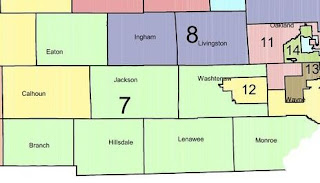It was my second journalistic Christmas.
This morning, Michigan's Republicans released their proposed redistricting plan for the states congressional, state Senate and state house representatives for the next 10 years. It comes just a few months after the U.S. Census Bureau released specific data for states and municipalities, which I blogged about here.
Manchester's positioning saw a bit of a change, namely in its state Senate district. Currently, the village, Manchester and Bridgewater townships are represented by State Sen. and Majority Leader Randy Richardville, R-Monroe, in the 17th District. Freedom and Sharon townships are in the 18th district.
 |
| Richardville's current district, which includes all of Monroe County, most of southern Washtenaw County and a few townships in Jackson County. |
Under the proposed plan, all four townships and the village would be placed in the 22nd District, which encompasses all of Livingston County and Washtenaw County west of Ann Arbor.
 |
| The new district with Manchester, with all four townships represented by the same senator. |
This move makes good sense for the village for a few reasons: One, the Greater Manchester community falls under the same Senator, which is a good thing. Two, it connects Manchester more with communities that are more similar to it and it relates to; Chelsea is a closer town to Manchester than say, Monroe.
The state House district remains very similar, covering most of western Washtenaw County. The only real difference is it snakes out a bit farther north and east, stretching to Salem Township, and no longer covers part of the City of Ann Arbor.
 |
| The new 52nd district, under the state GOP plan. |
 |
| The new 7th district, proposed by the Michigan legislature. If it goes into effect, the 7th would lose Calhoun County and pick up Monroe County. |
Of course, all this is conditional that the legislature approves the change and challenges to the plan are not successful. Plans must be completed and finalized by Nov. 1 of this year, and will take place during the next election cycle.
And because I can't help myself, here are a few other observations from around Michigan:
- People talk a lot about gerrymandering, or drawing the lines to benefit one party or another. The most obvious case I can see of this is the new 5th Congressional district, which takes Bay County, most of Saginaw County (including the city of Saginaw), western Tuscola County and all of Genesee County, home of Flint. The district is a very liberal one, and keeps many blue areas together.
- Detroit has the potential to not be represented by a native in both the state Senate and Congress, which was pointed out in this Detroit News article. Because of federal law, majority minority districts must be protected. And since Detroit lost so much in population the last 10 years, boundaries had to be expanded into more black suburbs, such as Southfield and Oak Park.
- As many people thought, Reps. Gary Peters, D-Bloomfield Township, and Sander Levin, D-Royal Oak, have been merged into one seat, since Michigan had to forfeit one of its 15 seats due to decrease in population. The next curious step is, who will run, and who will win?
- The 1st Congressional district, aka the "Yooper District," has boundaries that make more sense now. Before, the district, which spans the entire Upper Peninsula, reached down the eastern coast of Lake Huron and touched down into northern Bay County. Meanwhile, Traverse City and Leelanau County were represented by U.S. Rep. Dave Camp, R-Midland. The proposed map has the 1st district lines across the state, taking the complete upper third of the Lower Peninsula with it. This is a no-brainer, and probably should have been done 10 years ago.
Are there other anomalies with the proposed map? Share them in the comments, I'd love to hear them!
No comments:
Post a Comment